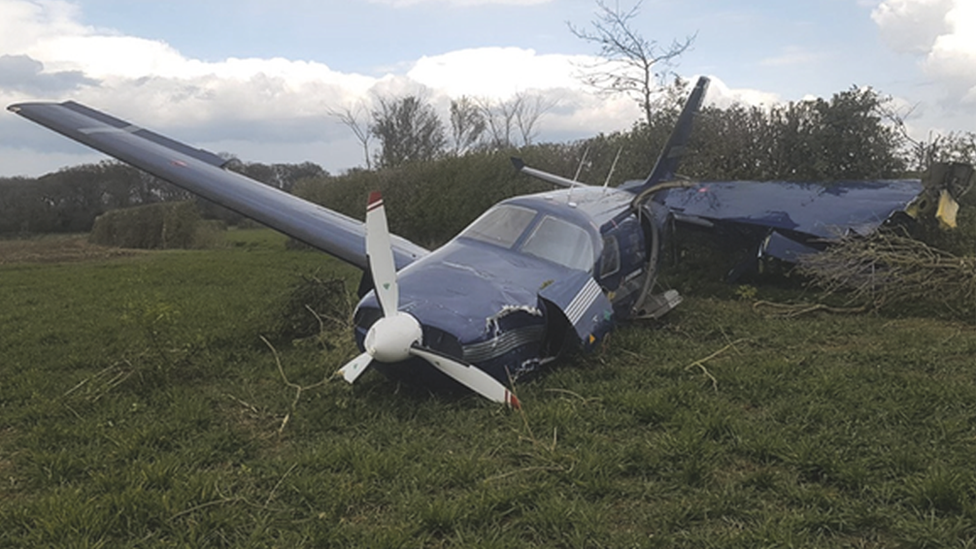Electric aircraft severely damaged in test flight over Cranfield
- Published

The aircraft's left wing broke away after it passed through a hedge upon landing in a field, the report said
An electrically powered aircraft had to carry out a forced landing after its battery was switched off as part of a flight test, a report said.
The modified Piper PA-46-350P was undertaking "experimental" tests when it "suffered a loss of power to the electrical motors", the Air Accidents Investigation Branch, external (AAIB) said.
It had to land near Cranfield Airport in Bedfordshire on 29 April 2021.
The aircraft was "severely damaged" in the landing, the AAIB said.
The plane was part of an experimental programme to provide aircraft propulsion systems with zero emissions and lower noise.
The piston engine had been replaced with two electrical motors suppled with electrical power from a high voltage lithium (HV) battery and a hydrogen fuel cell (HFC).
"As part of the test procedure, the battery was selected to OFF with the intention of leaving the electrical motors solely powered by the hydrogen fuel cell," the report said.
"During this interruption, the windmilling propeller on the aircraft generated voltage that was high enough to operate the inverter protection system.
"This then locked out the power to the motors and the pilot and observer were unable to reset the system and restore electrical power."
'Do something quick'
The flight observer said "the voltage is too high" when the power could not be restored and the pilot responded with "we've got to do something quick", the report said.
A forced landing was carried out and the aircraft touched down in a field and passed through a hedge when the left wing broke away.
The pilot and observer were uninjured, the report said.
It found a number of factors contributed to the accident, including: an ineffective emergency procedure, insufficient ground testing and the failure to review the risk assessment after the loss of propulsion on two previous flights.
The report also said the experiment team "had a high workload and there was pressure on them to achieve a long duration demonstration flight by the end of May 2021".
The operator's investigation found that some staff were showing signs that pressure was influencing them to make decisions based primarily on expediency," the report said.
The AAIB made five safety recommendations regarding the project and aircraft to the Civil Aviation Authority following its report.
As a result, the operator implemented a number of safety actions to address the report's findings, including managing "commercial pressure" to "ensure that it does not compromise safety".

Find BBC News: East of England on Facebook, external, Instagram, external and Twitter, external. If you have a story suggestion email eastofenglandnews@bbc.co.uk, external